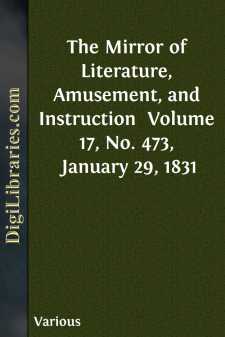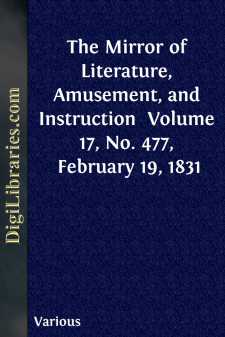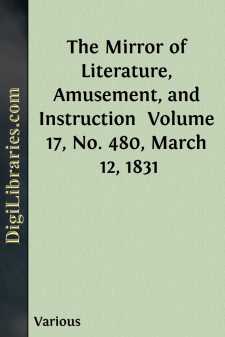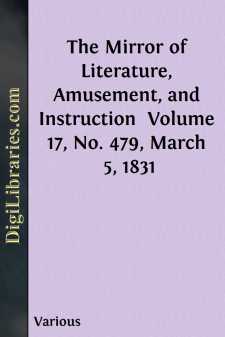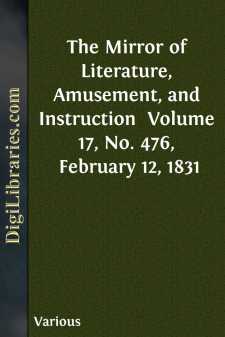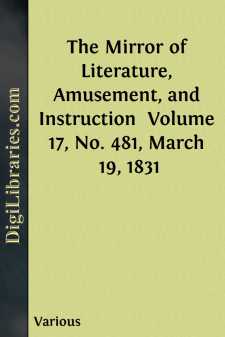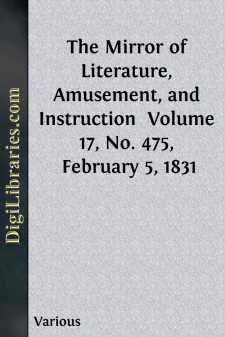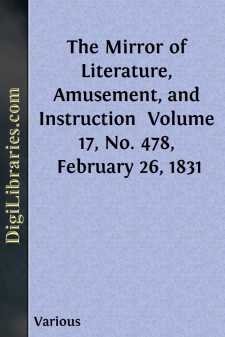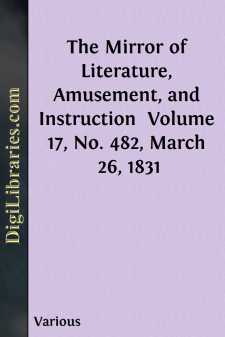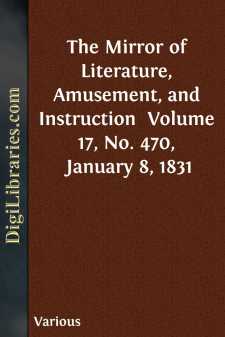Periodicals
- Art 27
- Children's periodicals 59
- Entertainment 5
- Food/Wine 2
- Games/Humor 455
- General 661
- Health 1
- History 53
- House/Home 1
- Regional 62
- Science/Nature 118
- Transportation 10
Periodicals Books
Sort by:
by:
Various
THE STRAND, ANCIENT AND MODERN. (Inscription copied from the original of the annexed Engraving.)In its ancient state, anno 1547.With the Strand Cross, Convent Garden, &c.With the Procession of Edward VI.And its Neighbourhood, anno 1700.Looking from Arundel House, northwards,With the Maypole and Garland.We have often, in our antiquarian notices of the Metropolis, touched upon the olden topography of...
more...
by:
Various
MOUNT ST. MICHAEL, NORMANDY. The interest attached to this extraordinary place is of so popular a character as fully to justify its introduction to our pages. It is situate at the southern extremity of the ancient province of Normandy, a district of considerable importance in the early histories of France and England. The "Mount" is likewise one of the most stupendous of Nature's...
more...
by:
Various
SWAN RIVER.(See the Engraving.)"A view in Western Australia, taken from a hill, the intended site of a Fort, on the left bank of the Swan River, a mile and a quarter from its mouth. The objects are, on the left, in the distance, Garden Island, that on the right of it Pulo Carnac; between the two is the only known entrance for shipping into Cockburn Sound, which lies between Garden Island and the...
more...
by:
Various
ANCIENT PALACE OF HOLYROOD, AT EDINBURGH. Here is another of the resting-places of fallen royalty; and a happy haven has it proved to many a crowned head; a retreat where the plain reproof of flattery— How can you say to me,—I am a king? would sound with melancholy sadness and truth. The reader of "the age and body of the time" need not be told that the tenancy of Holyrood by the Ex-King of...
more...
by:
Various
LORD BYRON'S PALACE, AT VENICE.LORD BYRON'S PALACE, AT VENICE.Scores of readers who have been journeying through Mr. Moore's concluding portion of the Life of Lord Byron, will thank us for the annexed Illustration. It presents a view of the palace occupied by Lord Byron during his residence at Venice. When, after his unfortunate marriage, he left England, "in search of that peace of...
more...
by:
Various
RELICS OF ARIOSTO.INKSTAND.CHAIR.We need not bespeak the reader's interest in these "trivial fond" relics—these consecrated memorials—of one of the most celebrated poets of Italy. They are preserved with reverential care at Ferrara, the poet's favourite residence, though not his birthplace. The Ferrarese, however, claim him "exclusively as their own" Lord Byron, in the...
more...
by:
Various
THE PRINCESS ELIZABETH'S COTTAGE, WINDSOR. They who draw their notions of royal enjoyment from the tinsel of its external trappings, will scarcely believe the above cottage to have been the residence of an English princess. Yet such was the rank of its occupant but a few years since, distant as may be the contrast of courts and cottages, and the natural enjoyment of rural life from the artificial...
more...
by:
Various
AUTOGRAPHS. It is long since our pages were illustrated with such characteristic lineaments as those on the opposite page. The reader will, however, perceive that we have not entirely forgotten the quaint motto from Shenstone, in our earlier volumes— "I want to see Mrs. Jago's handwriting, that I may judge of her temper." Still the annexed Autographs have not been drawn from our own...
more...
by:
Various
BRAY CHURCH. Who has not heard of the Vicar of Bray, and his turning, turning, and turning again? Here is his church, and a goodly tower withal, which we, in our turn, have endeavoured to turn to the illustration of our pages. There is no sinister motive in the selection; but if we have hit the white, or rather the black, of such variableness, "let the galled jade wince," and pay the Mirror the...
more...
by:
Various
Few places in Britain can boast of higher antiquity than the city of Chichester. Its origin is supposed to date back beyond the invasion of Britain by the Romans. It was destroyed towards the close of the fifth century, by Ella, but rebuilt by his son, Cissa, the second king of the South Saxons, who named it after himself, and made it the royal residence and capital of his dominions. Chichester, as may...
more...


